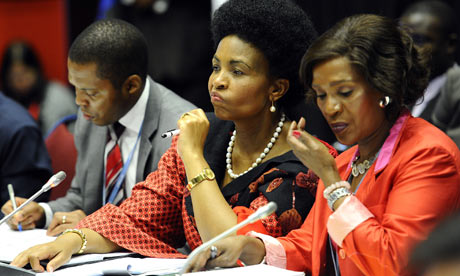Durban climate change talks: false text diverts race to reach deal
COP17 president issues official denial
of fake negotiating text sent to delegates trying to seal last-minute
agreement

Maite Nkoana-Mashabane, centre, at the COP17 talks.
Photograph: Stephane De Sakutin/AFP/Getty Images
A fake negotiating text has been circulated at the
UN climate talks in Durban in what some delegates believe to be a deliberate
attempt to derail the process, which is already in danger of failure because time
is fast running out to clinch a deal.
The talks were scheduled to finish on Friday evening but ran on through the
night, for the second night running. Negotiations dragged into Saturday
afternoon but with many delegates due to head home, there was a strong chance
real decisions would be put off until next year.
In what could have been a bizarre mistake, or else a
ploy to sabotage the talks, the fake text was sent to delegates with a note that
it had been drawn up by Mexico, the EU, the US and the Basic countries – Brazil,
South Africa, India and China. It
was dismissed by several of the countries named, who said it was different to
their position on key details.
In particular, the text said work on a new climate agreement should start in
the first half of 2012, when in fact the countries named want the new phase to
begin immediately, and it said a new legal instrument should be adopted with
effect from 2020, whereas the EU wants a text saying "no later than 2020".It also leaves out any new interpretation of the "common but differentiated responsibilities" (the principle by which developing countries were not expected to undertake legally binding cuts in carbon emissions), and gives a wrong date for reassessing the ambition of emissions-cutting commitments.
If the text was a forgery, it was a poor one: it was headed with the wrong date (Friday 10 December, instead of Saturday 10 December) and was printed in the wrong typeface (Arial, instead of Times New Roman) for an official document.
The president of the conference, Maite Nkoana-Mashabane, was forced to issue an official denial of the text, but
only after the bizarre episode had wasted valuable time.
Time is now the biggest issue at the talks, where
visibly exhausted delegates are trying to patch together a last-minute deal.
After a new negotiating text was issued close to midnight, ministers met in informal
groups throughout the early hours of the morning, until the whole meeting was
supposed to reconvene for the formal plenary session at 10am. However, that
timetable was thrown out and there an informal ministerial meeting was scheduled
for 4pm.
Chris Huhne, the UK
secretary of state for energy and climate change,
said: "We are almost literally running out of time. We [the UK and EU] can go on
as long as it takes to get a result, but there is obviously a risk that a number
of delegates for one reason and another may peel away, then we may have a less
representative [meeting]. We are almost literally working against the
clock."
Officials were concerned that some developing country delegates in particular
would have to leave, as some of the smaller nations have sent only one
representative. Some other countries also lack the authorisation to negotiate
without their minister present.At stake is a deal that looked tantalisingly close on Friday night, after the EU, the US, Japan, major developing economies such as Brazil and South Africa, the least developed countries, many African nations, and developed countries such as Canada and Australia all joined together in broad agreement. China and India were not agreeing to the text, but also not strenuously opposing it, according to several participants. There are doubts over whether Russia and Saudi Arabia would accept the deal but they have been mostly silent.
The deal, if successful, would for the first time bring all of the world's countries into a single legal instrument stipulating cuts in emissions from the major economies, to be signed off in 2015 and with the targets to kick in from 2020 at the latest. Wrangling over the wording had produced several compromises, chief of which was settling on a phrase to describe the legal form of the new agreement. Eventually the phrase "a legal instrument applicable to all parties", which was acceptable to both the EU and the US, was adopted.
In return for the agreement, the EU would proceed with a second commitment period to cut emissions under the 1997 Kyoto protocol, the world's only existing treaty stipulating emissions cuts. The first commitments under the protocol run out in 2012, and the EU is the only major developed country bloc to agree to a continuation – Japan, Canada and Russia have all refused, and the US has never ratified the pact. Developing countries, including China, have long insisted that the Kyoto protocol must continue beyond 2012.
Time is now so short in the negotiations that the proposed new deal – despite its broad support and after two weeks of heavy negotiations – may not even be properly put to the vote. However, some delegates remained hopeful. One developed country diplomat said: "The mood is that there is a will to do something. I don't detect a sign of any major players trying to bring this down."
No comments:
Post a Comment